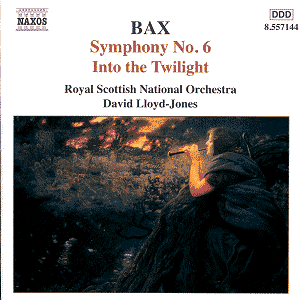This latest disc in David Lloyd-Jones’ admirable Bax
cycle for Naxos has been greeted with a general chorus of approval,
including in these columns. I’m afraid I have to be rather boring and
agree, and though it doesn’t entirely erase memories of Bryden Thomson
on Chandos, it must really be given thumbs up as the best version now
before the public.
It is interesting doing an A-B comparison with the
Thomson, as strengths and weaknesses on both sides are apparent from
the start. The first thing that struck me was the difference in recording
quality. The Chandos disc has a characteristic resonance (too much so,
for some) and a brightly-lit top, whereas the Naxos is a little bass-heavy
for my liking but is much better balanced generally, also warmer overall.
I think the latter helps with Bax’s rich textures, and the marvellous,
pounding ostinato that opens the work has tremendous weight and presence.
I think the orchestral playing is also generally finer on the Naxos.
A good example is the unanimity of string tone in the difficult largamente
unison passage at 2’04, where Chandos’s LPO strings are quite scrappy
compared to the RSNO. There is quite a lot of cruelly exposed high string
writing throughout this piece, and the Scottish strings are well on
top of things. I marginally prefer Thomson’s delicate handling of the
limpid flutes at the start of the second subject (3’57), though Lloyd-Jones
does pace himself better into the development section (5’57), where
the chattering woodwind have great character and wit. Both conductors
handle things well towards the end of the movement, and are in fact
remarkably similar in the Mars-like chromatic brass chords that
dominate the final pages.
The start of the second movement brought me up short
at first, mainly because of Naxos’s extremely close miking of the harp
– yes it should stand out, but is only marked p against the woodwind’s
pp. I think Lloyd-Jones captures the Debussian atmosphere well
(hints of La Mer at 2’07), and I love the little duet between
trumpet and horn at 3’30; this is a shade perfunctory on the Chandos,
though I marginally prefer the balance Thomson achieves in this passage.
There is a note by Lloyd-Jones in the booklet concerning a tambourine
passage at Fig.13 that he has omitted. If so, he must have forgotten
to tell the tambourine player, for like Stephen Johnson (reviewing in
BBC Music Magazine) I could hear it quite clearly, tapping steadily
through the texture at 7’06. It’s a small point, but obviously an oversight
on someone’s part.
I think the finale, the best and most ingenious movement
in the work, is an unqualified success on Naxos. Lloyd-Jones has the
measure of its structural shifts and his orchestra do him proud – what
a gorgeous clarinet solo at the opening. Two other clarinets, bassoons,
horns and harp then join to produce a magical little chamber group,
reminiscent of a passage in his Nonet. The tempo and phrasing throughout
this movement is superb, and is generally (just) to be preferred to
Thomson, especially the closing moments, where Lloyd-Jones is perfectly
attuned to Bax’s marking of molto tranquillo. I’m no Bax expert,
but I can only agree with those that are, when they say this is his
finest symphonic creation.
The tone-poem fill-ups were new to me and very enjoyable,
though after the ‘sturm und drang’ of the symphony appear as
pastoral, Delian stocking-fillers. Still, it’s valuable to have such
works on disc, so we can have as comprehensive a survey of the composer
as possible. Graham Parlett provides excellent notes.
It seems Chandos are going to undertake yet another
Bax symphony cycle with Vernon Handley, which is almost perverse when
their Thomson cycle sounds so well and is at mid-price. There seems
little doubt at the moment, though, that the Bax palm must currently
go to Naxos, whose budget series is as perfect a way as any to get to
know these endlessly rewarding works.
Tony Haywood
See also reviews by Ian Lace
and Rob Barnett
Arnold Bax website

![]() Royal Scottish National
Orchestra/David Lloyd-Jones
Royal Scottish National
Orchestra/David Lloyd-Jones ![]() NAXOS 8.557144 [57.46]
NAXOS 8.557144 [57.46]